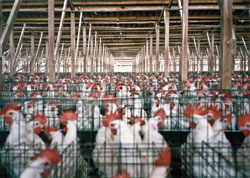California’s ban on standard-caged birds poses a chicken-egg problem

More than 90 percent of U.S. eggs come from
facilities where chickens are confined in
cramped cages. Photo: Farm Sanctuary.
Which should come first: California’s right to regulate how eggs are sold or other states’ rights to regulate their farms?
That’s the question that drives six states in their lawsuit against California, filed in federal court in Fresno. The states are taking issue with a California law banning the sale of eggs from hens kept in “battery cages,” which confine chickens to about 67 square inches per bird and which are usually lined side by side in coops. Animal welfare groups say battery cages are cruel because the cages don’t allow hens to walk around, nest or even spread their wings. They say the stress and confinement make hens more susceptible to diseases, including salmonella infection, the major public health concern for eggs.
But battery cages are the U.S. industry standard, used to produce more than 90 percent of eggs. And California imports 4 billion eggs a year, according to the complaint.
That’s why farmers in Alabama, Iowa, Kentucky, Missouri, Nebraska and Oklahoma face a dilemma, says their lawsuit filed in the Eastern District of California. Farmers can make an expensive conversion to larger “colony cages” or cage-free farms, which could make the price of their eggs too high to compete outside California, the suit says. Or they can pull out of California, flooding other states with their eggs and risking a price drop that could put them out of business. Because of these effects on out-of-state farmers, the suit says, the Golden State is effectively regulating interstate commerce, in violation of the Constitution’s dormant commerce clause.
Click here to read the rest of “States Cry Fowl” from the June issue of the ABA Journal.
Updated June 23 to fix “click here” link.



